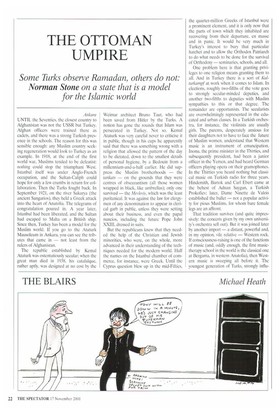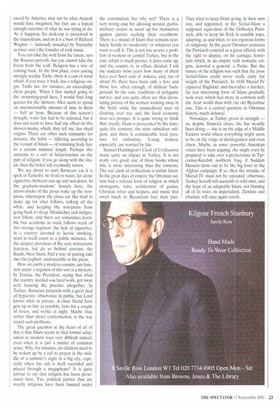THE OTTOMAN UMPIRE
Some Turks observe Ramadan, others do not:
Norman Stone on a state that is a model
for the Islamic world
Ankara UNTIL the Seventies, the closest country to Afghanistan was not the USSR but Turkey. Afghan officers were trained there as cadets, and there was a strong Turkish presence in the schools. The reason for this was sensible enough: any Muslim country seeking regeneration would look to Turkey as an example. In 1918, at the end of the first world war. Muslims tended to be defeatist: nothing could stop the triumphant West. Istanbul itself was under Anglo-French occupation, and the Sultan-Caliph could hope for only a few crumbs in return for collaboration. Then the Turks fought back. In September 1921, on the river Sakarya (the ancient Sangarios), they held a Greek attack into the heart of Anatolia. The telegrams of congratulation poured in. A year later, Istanbul had been liberated, and the Sultan had escaped to Malta on a British ship. Since then, Turkey has been a model for the Muslim world. If you go to the Ataturk Mausoleum in Ankara, you can see the tributes that came in — not least from the rulers of Afghanistan.
The republic established by Kemal Ataturk was ostentatiously secular; when the great man died in 1938, his catafalque, rather aptly, was designed at no cost by the Weimar architect Bruno Taut, who had been saved from Hitler by the Turks. A notion has gone the rounds that Islam was persecuted in Turkey. Not so. Kemal Ataturk was very careful never to criticise it in public, though in his cups he apparently said that there was something wrong with a religion that allowed the pattern of the day to be dictated, down to the smallest details of personal hygiene, by a Bedouin from a millennium-and-a-half earlier_ He did suppress the Muslim brotherhoods — the tarikats — on the grounds that they were centres of obscurantism (all those women wrapped in black, like umbrellas); only one survived — the Mevlevis. which was the least puritanical. It was against the law for clergymen of any denomination to appear in clerical garb in public, unless they were setting about their business, and even the papal nuncios, including the future Pope John XXIII, dressed in suits.
But the republicans knew that they needed the help of the Christian and Jewish minorities, who were, on the whole, more advanced in their understanding of the techniques needed for the modern world. Half the names on the Istanbul chamber of commerce, for instance. were Greek. Until the Cyprus question blew up in the mid-Fifties, the quarter-million Greeks of Istanbul were a prominent element, and it is only now that the parts of town which they inhabited are recovering from their departure, en masse and in panic. It would be very much in Turkey's interest to bury that particular hatchet and to allow the Orthodox Patriarch to do what needs to be done for the survival of Orthodoxy — seminaries, schools, and all.
One problem here is that granting privileges to one religion means granting them to all. And in Turkey there is a sort of Kulturkampf at work when it comes to Islam. In elections, roughly two-fifths of the vote goes to strongly secular-minded deputies, and another two-fifths to deputies with Muslim sympathies to this or that degree. The remainder are opportunists. The secularists are overwhelmingly represented in the educated and urban classes. In a Turkish orchestra, for instance, the violinists are usually girls. The parents, desperately anxious for their daughters not to have to face the future of Muslim women, understand that Western music is an instrument of emancipation. Inonu, the prime minister in the Thirties, and subsequently president, had been a junior officer in the Yemen, and had heard German officers playing opera on their gramophones. In the Thirties you heard nothing but classical music on Turkish radio for three years. Hindemith, Bartok and Carl Ebert came at the behest of Adnan Saygun, a Turkish Prokofiev; later, Dame Ninette de Valois established the ballet — not a popular activity for pious Muslims, for whom bare female legs are an affront.
That tradition survives (and quite impressively: the concerts given by my own university's orchestra sell out). But it was joined later by another import — a distant, powerful and, in my opinion, vile relative — Western rock. If consciousness-raising is one of the functions of music (and. oddly enough, the first musictherapy school in the world is the classical one at Bergama, in western Anatolia), then Western music is sweeping all before it. The youngest generation of Turks, strongly influ enced by America, may not be what Ataturk would have imagined, but they are a logical enough outcome of what he was trying to do. As it happens, his desk-top is preserved in the mausoleum, and on it is a bust of Richard Wagner — famously assaulted by Nietzsche as (mu!. mu!.) the founder of rock music.
You can take the wolf from the forest, says the Russian proverb, but you cannot take the forest from the wolf. Religion has a way of coming back, In the first place, even among strongly secular Turks, there is a cast of mind which, if you trace it back, has a religious origin. Turks are, for instance, an exceedingly clean people. When I first started going to the swimming-pool here, I would find long queues for the showers. Men seem to spend an unconscionable amount of time in them — half an hour. Because of this season's drought, water has had to be rationed, but it does not seem to have had any effect on this shower-mania, which, they tell me, has ritual origins. There are other such remnants: for instance, the habit — differing according to the variant of Islam — of trimming body hair to a certain minimal length. Perhaps this amounts to a sort of behaviourism on the part of religion: if you go along with the rituals, then the belief will eventually return.
We are about to start Ramazan (as it is spelt in Turkish): no food or water, let alone cigarettes, between sun-up and sun-down. In the graduate-students' hostels here, the alarm-clocks of the pious wake up the nonpious, whereupon the pious eat like mad to make up for what follows, talking all the while. and keeping the non-pious from going back to sleep. Headaches and indigestion follow, and there are sometimes horrible bus accidents as week follows week of this strange regimen: the lack of cigarettes, in a country devoted to heroic smoking, must in itself count as a public nuisance. In the deepest provinces of the east, restaurants function, hut do so behind curtains; the Kurds, bless them, find a way of putting raki into the yoghurt, undetectable to the pious.
How on earth a modern country can function under a regimen of this sort is a mystery. In Tunisia. the President, saying that what the country needed was hard work, got away with banning the practice altogether. In Turkey. Rarnazan proceeds with a great deal of hypocrisy: observance in public, but Lord knows what in private. A close friend here gets up as late as possible, fasts for a couple of hours, and works at night. Maybe that, rather than direct confrontation, is the way round such problems.
The great question at the heart of all of this is that Islam seems to find formal adaptation to modern ways very difficult indeed, even when it is just a matter of common sense. Why, for instance, do children need to be woken up by a call to prayer in the middle of a summer's night in a big city, especially when the call is itself recorded and played through a megaphone? It is quite untrue to say that religion has been persecuted here, Yes, political parties that are overtly religious have been banned under the constitution; but why not? There is a very strong case for allowing secular, parliamentary orders to stand up for themselves against parties seeking their overthrow. There is a strand of Islam that remains resolutely hostile to 'modernity' or whatever you want to call it. This is not too severe a problem in western or central Turkey, but in the east, which is much poorer, it does come up, and the country is, in effect. divided. I ask my students most years how many of them have ever been east of Ankara, and, out of about 50, there have been only a few; and those few, often enough, of military background. In the east, traditions of polygamy survive, and you quite often see that devastating picture of the women working away in the fields while the mustachioed men sit chatting over tea; and the local economy does not prosper. It is quite wrong to think that, locally. Islam is persecuted by the state; quite the contrary, the state subsidises religion, and there is considerable local pressure for orthodoxy. Young women, especially, are worried by this.
Samuel Huntington's Clash of Civilizations made quite an impact in Turkey. It is not really very good; one of those books whose title is more interesting than the contents. The real clash of civilisations is within Islam. In the great days of empire the Ottoman sultans had a relaxed form of religion in which monogamy, wine, architecture of genius, Christian wives and helpers, and music that owed much to Byzantium had their part. They tried to keep Islam going, in their own way, and appointed, in the Seyhul-Islam a supposed equivalent of the Orthodox Patriarch, able to keep his flock in sensible ways, adapting, as and when, to less rigorous forms of religiosity. In the great Ottoman centuries the Patriarch counted as a great official, with the right to display, on his carriage, horsetails which, in an empire with nomadic origins, denoted a general, a Pasha. But the nature of the religion was such that the poor Seyhul-Islam could never really carry the weight of the Patriarch. In 1638 Murad IV captured Baghdad, and thereafter a harsher, far less interesting form of Islam gradually took over, which had more in common with the Arab world than with the old Byzantine one. This is a central question in Ottoman history, much debated.
Nowadays, as Turkey grows in strength — as, despite financial crises, she has steadily been doing — she is on the edge of a Middle Eastern world where everything might seem to be on the verge of disintegration and even chaos. Maybe, as some powerful American voices have been arguing, she might even be prepared to take over a protectorate in Turcoman-Kurdish northern Iraq. if •Saddam Hussein turns out to be the big loser in the Afghan campaign. If so, then the mistake of Murad IV must not be repeated; otherwise, Turkey herself will succumb to wild men, and the hope of an adaptable Islam, not blaming all of its woes on imperialism. Zionism and whatnot, will once again vanish.























































































 Previous page
Previous page